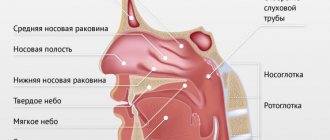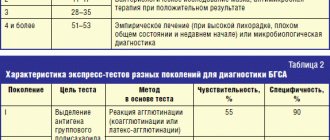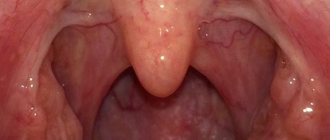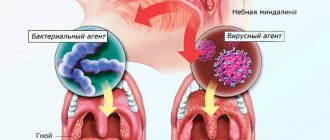12/21/2021
79 475
17 minutes
Co-author, editor and medical expert – Maksimov Alexander Alekseevich.
- Symptomatic treatment
- Rinsing
Many people are familiar with the diagnosis of tonsillitis. This unpleasant disease can take you by surprise and prevent you from leading a normal life. Tonsillitis is a pressing problem today, as it can occur at any age and with various diseases, such as herpes, diphtheria, streptococcal infections, scarlet fever and others. Often tonsillitis (or simply tonsillitis) acts as an independent disease. To understand the diagnosis and begin proper treatment, you need to consult a doctor. Remember that self-medication can lead to complications. What is tonsillitis? And how to cope with this disease? We will consider the answers to these questions below.
Up to contents
Forms of tonsillitis
Tonsillitis (or sore throat) is an inflammation of the tonsils, often accompanies colds.
Types of sore throats
Sore throats are acute:
- Banal (vulgar or typical) tonsillitis: there are catarrhal, follicular, lacunar, mixed.
- Atypical tonsillitis: herpetic, Simanovsky-Plaut-Vincent's tonsillitis, phlegmonous, fungal and mixed forms. Usually they are severe, as they appear against the background of decreased immunity.
- Sore throats associated with infectious diseases (scarlet fever, diphtheria, sore throat due to HIV infection and others).
- Angina in blood diseases: monocytic, agranulocytic, tonsillitis in leukemia.
Tonsillitis can also be chronic (compensated and decompensated)1.
Interesting fact!
Our defense against infections is located in the pharynx - an anatomical structure consisting of lymphoid tissue. The lymphoid elements in the pharynx are located around the pharynx in the form of a ring, so it was called the “lymphadenoid pharyngeal ring” by Waldeyer-Pirogov. It is formed by two palatine tonsils (those that are sometimes called “tonsils”), one pharyngeal or nasopharyngeal (located on the back wall of the pharynx), one lingual (a collection of lymphoid follicles at the root of the tongue) and two tubal (located in the thickness of the mucous membrane of the nasopharynx near the openings eustachian tubes). Tubal tonsils are most pronounced in children under 5-7 years of age, and later undergo reverse development. In adults, due to their small size, they are almost invisible.
The pharyngeal ring is an additional barrier for bacteria between the external and internal environment of the body. These structures also produce antibodies and lymphocytes - immune response cells.
Acute tonsillitis
This is an acute inflammatory disease of the palatine tonsils. Their mucous membrane becomes swollen, hyperemic, and purulent deposits may appear in the crypts of the tonsils. But depending on the factors that caused the disease and the patient’s condition, the process is not limited to damage to the tonsils alone. A severe infection can take over the entire body. The most dangerous complications are rheumatic heart defects, joint damage, kidney damage (glomerulonephritis). Therefore, self-medication can be dangerous. For correct diagnosis and effective treatment, you need to consult a specialist.
Purulent tonsillitis is one of the forms of tonsillitis and can be a complication of acute or chronic tonsillitis. It is characterized by the presence of purulent discharge in the crypts of the palatine tonsils. Most often accompanies a bacterial infection. Improper treatment can lead to chronicity of the process.
Chronic tonsillitis is a persistent chronic inflammation of the tonsils, characterized by recurrent exacerbations in the form of tonsillitis, a sluggish course, and a decrease in the body's resistance to infection. Slight hypothermia or draft causes exacerbation of tonsillitis. Many factors play a role in the pathogenesis of chronic inflammatory process in the tonsils. Most often the disease occurs after repeated sore throats. Chronic tonsillitis is of two types: compensated and decompensated. This is important for further treatment tactics.
With compensated chronic tonsillitis, examination reveals some looseness of the tonsils, hyperemia, swelling, purulent plugs or plaque in the crypts of the tonsils, but this process is limited to the tonsils and does not spread beyond its boundaries. This precarious balance between local immunity and the body’s resistance on the one hand, and the presence of pathogenic organisms in the inflamed tonsils on the other, can shift towards decompensation if the course of the disease is unfavorable. With decompensated chronic damage to the lymphoid apparatus of the pharynx, local signs of chronic tonsillitis are usually clearly expressed. With this form, exacerbations often occur in the form of sore throats, peritonsillitis, peritonsillar abscesses, regional lymphadenitis, and in clinically advanced cases, disturbances in the functioning of other organs and systems (kidney pathology, formation of cardiac flow, articular syndrome, damage to the nervous system).
Up to contents
To treat or not to treat?
This question is often asked by patients suffering from periodic exacerbations of this disease. Many are sure that it is pointless to treat it, since the symptoms will return again. Yes, the treatment of chronic inflammation is a long, complex process that requires a lot of patience from the patient and high qualifications and experience of the otolaryngologist. The bacteria that cause the disease adapt very quickly to antibiotics. Therefore, it is extremely important and necessary to cure the disease in its acute form, all its manifestations. Others do not consider this disease dangerous in principle: unpleasant, yes, but not dangerous. Both approaches are completely wrong!
You cannot treat the disease carelessly, much less let its development take its course. If the disease is not cured, the bacteria can spread to other organs, causing serious complications: for example, joint diseases, myocarditis, glomerulonephritis.
Pregnant women are at particular risk: if a woman is planning a child, it is simply necessary to treat tonsillitis. After all, the disease can provoke miscarriage or premature birth. In addition, the disease greatly complicates the course of pregnancy and affects the fetus.
Symptoms of tonsillitis
Clinical manifestations are quite varied and depend on the type of tonsillitis. The disease debuts acutely, against the background of hypothermia or stress. First there is a sore throat. It may intensify when swallowing, after smoking, or eating hard, dry foods. There is a cough, a feeling of a foreign body in the throat, rawness, soreness in the throat. The body temperature rises, the patient feels weak, tired, unwell, quickly gets tired, and there is pain in the joints and muscles. Upon examination, the doctor reveals enlarged and painful submandibular and cervical lymph nodes; the pharyngoscopic picture varies from hyperemia of the tonsils to friability, purulent changes (lacunae and follicles), and enlarged tonsils. The mucous membrane becomes swollen. In the presence of purulent plaque, a characteristic unpleasant odor from the mouth may appear.
Treatment for tonsillitis depends on its type and cause. Let's look at it in detail:
Etiotropic treatment (impact on the cause of the disease) depends on the causative agent of the disease. If a sore throat is bacterial in nature and if there are indications, antibiotics are used, which are prescribed by a doctor. Self-treatment of tonsillitis with antibiotics is not recommended, since an insufficient dose or the wrong choice of drug can lead to the development of resistance (persistence) in the microorganism, as well as to complications of angina (for example, peritonsillar, retropharyngeal abscess, diphtheria croup in children, acquired heart defects). For a viral infection, symptomatic therapy is prescribed, as the patient’s general condition remains satisfactory. Physiotherapy methods are also effective: ultraviolet irradiation increases the barrier function, the resistance of the tonsils, improves, stimulates local and general immunity, and has an antimicrobial effect. Laser treatment of tonsillitis in the submandibular area is carried out daily, in a course. The therapeutic effect is achieved by dilating small blood vessels and increasing blood circulation in the area of inflammation1.
Symptomatic treatment
Anti-inflammatory drugs (paracetamol, ibuprofen, aspirin) have proven themselves well in the treatment of tonsillitis. They reduce swelling, inflammation, and as a result, pain. Antihistamines (Zyrtec, Tavegil) and analgesics are also used. For the duration of treatment, smoking, drinking alcohol, and spicy and hot foods are excluded. A gentle diet and bed rest are prescribed for 5-7 days.
If the patient’s general condition does not suffer, we can limit ourselves to the use of local means of treating tonsillitis.
Local treatment consists of prescribing medications that have an antiseptic, anti-inflammatory, and analgesic effect2. Drugs for local therapy should not only relieve sore throat, but also have a wide spectrum of antibacterial activity, low allergenicity, and be non-toxic.
Hexoral ® has all these properties. The drug is active against a wide range of gram-positive bacteria, as well as pathogenic fungi of the genus Candida; the drug Hexoral ® can have its effect in the treatment of infections caused by Pseudomonas aeruginosa and Proteus. At a concentration of 100 mg/ml, the drug inhibits the growth of most bacterial strains. Hexetidine, being the active ingredient of the drug Hexoral ®, also has an anesthetic effect on the mucous membrane3. The variety of dosage forms of Hexoral ® makes its use accessible to the whole family. Hexoral ® spray is a convenient, effective and proven form for the treatment of tonsillitis in adults and children from 3 years of age. The Hexoral® line also includes a rinse solution (from 3 years old), Hexoral® tabs tablets (from 4 years old), Hexoral® tabs Classic (from 6 years old), Hexoral® tabs Extra (from 12 years old) years). In the form of a rinse solution, lozenges and sprays, the medicine is convenient to use, which makes patient adherence to treatment high.
In all cases of tonsillitis, it is necessary to consult a doctor, so that only a specialist can prescribe adequate treatment and prevent complications.
Surgery
Tonsillectomy is the removal of tonsil tissue and the underlying capsule. It is used in cases of unsuccessful conservative therapy, in the presence of a focus of chronic infection in the tonsils. A tonsillectomy is performed by an ENT doctor. Before the operation, you should consult with a therapist, do blood and urine tests, perform an ECG, and a chest x-ray. If there are concomitant diseases, undergo additional examination by specialized specialists.
Tonsillectomy is usually performed under local anesthesia with the patient sitting. Local anesthesia is performed, and then the tonsils are removed along with the capsule. The operation does not last long, about 10 minutes, complications are quite rare. Indications for surgical treatment are chronic persistent inflammation of the palatine tonsils in the stage of decompensation, frequent exacerbations of chronic tonsillitis, purulent complications in the form of abscesses and phlegmon.
Contraindications for tonsillectomy are: blood diseases (hemorrhagic diathesis), neuropsychiatric diseases in the stage of decompensation, which can interfere with the course of the operation and compliance with the postoperative regimen, open form of respiratory tuberculosis, cardiac, renal failure, severe diabetes mellitus. In each specific case, the issue of performing an operation is decided individually1.
Cryotherapy is a gentle method of semi-surgical treatment. Cryotonsillotomy - exposure to the tonsils with a special applicator (cryoprobe), in a closed system of which liquid nitrogen circulates at a temperature of -196 °C4. Areas of chronic inflammation where the tonsil no longer performs its functions are removed. Since cryotherapy is painless and bloodless, it is the method of choice for weakened patients, patients with blood diseases and those for whom surgical treatment is contraindicated (allergy to novocaine, severe diabetes mellitus, uncontrolled hypertension, severe heart failure, renal failure, hemophilia) and also in children. After cryodestruction, the body recovers more quickly and the patient returns to normal life. However, along with the advantages, the cryosurgical method has a number of disadvantages: several stages are assumed over 1.5 months, but in some cases it is not possible to achieve complete removal of tonsil tissue.
Contraindications to cryotherapy: decompensation of diabetes mellitus, some oncological diseases, acute myocardial infarction, high-grade heart failure, severe hypertension.
Up to contents
When to see a doctor
Frequent cases of sore throat, prolonged recovery from respiratory infections, and persistent cough are reasons to immediately seek help from an otolaryngologist. The specialist will not only conduct a comprehensive diagnosis of the body, but will also tell you how to quickly and without consequences cure chronic tonsillitis. For additional consultations and examinations, you can contact the doctors of JSC "Medicine" (clinic of academician Roitber) in the central district of Moscow at the address: 2nd Tverskoy-Yamskaya lane, 10 (metro stations Mayakovskaya, Belorusskaya, Novoslobodskaya, Tverskaya, Chekhovskaya) . Experienced ENT doctors will offer an effective course of treatment for tonsillitis, taking into account the age and characteristics of the patient’s body. The selection of antibiotic drugs and physical therapy will be made based on the results of the examination and a history of diseases.
Treatment at home
To determine the diagnosis and begin treatment, contact your doctor. If you are diagnosed with acute tonsillitis, you must observe strict bed rest in the first days of the disease, then limit physical and psycho-emotional stress, which will help get rid of complications, among other things. The patient is given a personal plate, spoon, mug and, if possible, isolated. Prescribe non-irritating, soft foods, mainly plant-based, dairy, vitamin C, and plenty of warm drinks. Symptomatic therapy is also carried out: taking antipyretic, anti-inflammatory, painkillers.
Rinsing
Special attention should be paid to local therapy. Gargling with antiseptic solutions (Hexoral ® gargling solution) is useful for tonsillitis. The drug Hexoral ® has broad antibacterial activity, including against gram-positive microbes, is also active against the pathogenic genus of fungi Candida, and has an effect in the treatment of infections caused by Pseudomonas aeruginosa and Proteus. The antimicrobial effect of the drug is associated with the suppression of metabolism in bacteria, their oxidative reactions, without which the latter cannot exist (thiamine antagonist). At a concentration of 100 mg/ml, the drug inhibits the growth of most bacterial strains. The development of resistance to Hexoral ® is not observed. The active substance hexethidine has a mild analgesic effect on the mucous membrane of the pharynx and tonsils, can linger on it for a long time and is practically not absorbed. Therefore, it does not have a systemic effect. When using the drug Hexoral ®, regression of inflammatory changes in the pharynx may be observed5. It is recommended to use 15 ml of undiluted solution 2 times a day after meals, unless otherwise prescribed by a doctor. Before use, consult a specialist.
Rinsing is an effective method and an important component of the fight against tonsillitis, which can be successfully used in home treatment. Rinsing with a salt solution, irrigating the oropharynx with sprays with sea water, a decoction of chamomile, sage, chlorhexidine and other antiseptics help well. Rinsing with solutions at body temperature (36-37 degrees) reduces inflammation, mechanically cleanses the mucous membrane of the oropharynx from viruses, bacteria, pus, helps relieve swelling, and as a result, reduce sore throat. Rinsing is completely safe for children, pregnant women and nursing mothers.
Washing the lacunae of the tonsils with antiseptics is used for many types of both acute and chronic tonsillitis. The most common method of washing the lacunae of the tonsils is according to N.V. Belogolov. and Ermolaev V.G1. This effective procedure is performed by an otolaryngologist. Under the control of pharyngoscopy, the doctor sequentially inserts a thin cannula through each lacuna into the crypt of the tonsil, and with a syringe filled with an antiseptic, under pressure washes out everything unnecessary from the lacuna. As a rule, 2-3 crypts of the upper part of the tonsil are washed. All tonsil crypts are usually connected to each other, so the entire tonsil is washed and drained. After this, the treated mucous membrane is lubricated with Lugol’s solution, iodine, and 5% collargol. The positive effect of the procedure is achieved by mechanically flushing the lacunae from pus and restoring their drainage function. Treatment is carried out in a course of 10-15 washes, which are prescribed every other day.
Risk factors
The risk of developing chronic tonsillitis of the throat increases if the patient has a hereditary predisposition to the disease. About 3% of all recorded cases are transmission of the inflammatory process from parents to children. Also, the protracted course of infectious diseases is caused by formations in the nasal cavity, polyps and sinusitis. The source of infection can be a carious tooth, gum disease, or periodontitis. Additionally, the body is weakened by poor nutrition, bad habits, constant stressful situations, and prolonged use of potent drugs.









